Jack Tar: Life in Nelson’s Navy by Lesley Adkins & Roy Adkins
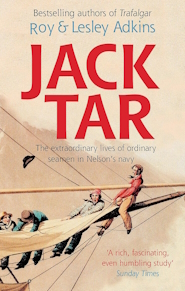 The Royal Navy to which Admiral Lord Nelson sacrificed his life depended on thousands of sailors and marines to man the great wind-powered wooden warships. Drawn from all over Britain and beyond, often unwillingly, these ordinary men made the navy invincible through skill, courage and sheer determination. They cast a long shadow, with millions of their descendants alive today, and many of their everyday expressions, such as ‘skyscraper’ and ‘loose cannon’, continuing to enrich our language. Yet their contribution is frequently overlooked, while the officers became celebrities.
The Royal Navy to which Admiral Lord Nelson sacrificed his life depended on thousands of sailors and marines to man the great wind-powered wooden warships. Drawn from all over Britain and beyond, often unwillingly, these ordinary men made the navy invincible through skill, courage and sheer determination. They cast a long shadow, with millions of their descendants alive today, and many of their everyday expressions, such as ‘skyscraper’ and ‘loose cannon’, continuing to enrich our language. Yet their contribution is frequently overlooked, while the officers became celebrities.
JACK TAR gives these forgotten men a voice in an exciting, enthralling, often unexpected and always entertaining picture of what their life was really like during this age of sail. Through personal letters, diaries and other manuscripts, the emotions and experiences of these people are explored, from the dread of press-gangs, shipwreck and disease, to the exhilaration of battle, grog, prize money and prostitutes. …

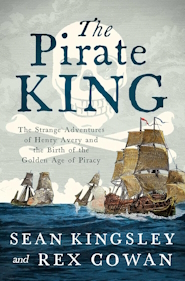 Henry Avery of Devon pillaged a fortune from a Mughal ship off the coast of India and then vanished into thin air—and into legend. More ballads, plays, biographies and books were written about Avery’s adventures than any other pirate. His contemporaries crowned him “the pirate king” for pulling off the richest heist in pirate history and escaping with his head intact (unlike Blackbeard and his infamous Flying Gang). Avery was now the most wanted criminal on earth. To the authorities, Avery was the enemy of all mankind. To the people he was a hero. Rumors swirled about his disappearance. The only certainty is that Henry Avery became a ghost.
Henry Avery of Devon pillaged a fortune from a Mughal ship off the coast of India and then vanished into thin air—and into legend. More ballads, plays, biographies and books were written about Avery’s adventures than any other pirate. His contemporaries crowned him “the pirate king” for pulling off the richest heist in pirate history and escaping with his head intact (unlike Blackbeard and his infamous Flying Gang). Avery was now the most wanted criminal on earth. To the authorities, Avery was the enemy of all mankind. To the people he was a hero. Rumors swirled about his disappearance. The only certainty is that Henry Avery became a ghost.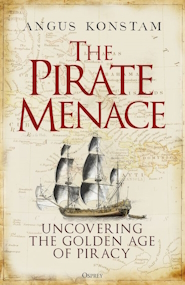 This account explores the most notorious pirates in history and how their rise and fall can be traced back to a single pirate haven, Nassau. Angus Konstam, one of the world’s leading pirate experts, has brought his 30 years of research to create the definitive book on the Golden Age of Piracy. Many of the privateers the British had used to prey on French and Spanish shipping during the War of the Spanish Succession turned to piracy. The pirates took over Nassau on the Bahamian island of New Providence and turned it into their own pirate haven, where shady merchants were happy to buy their plunder. It became the hub of a pirate network that included some of the most notorious pirates in history: Blackbeard, ‘Calico Jack’ Rackam, Charles Vane and Bartholomew Roberts.
This account explores the most notorious pirates in history and how their rise and fall can be traced back to a single pirate haven, Nassau. Angus Konstam, one of the world’s leading pirate experts, has brought his 30 years of research to create the definitive book on the Golden Age of Piracy. Many of the privateers the British had used to prey on French and Spanish shipping during the War of the Spanish Succession turned to piracy. The pirates took over Nassau on the Bahamian island of New Providence and turned it into their own pirate haven, where shady merchants were happy to buy their plunder. It became the hub of a pirate network that included some of the most notorious pirates in history: Blackbeard, ‘Calico Jack’ Rackam, Charles Vane and Bartholomew Roberts.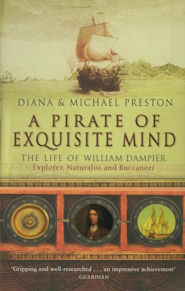 William Dampier was an English adventurer and pirate who preyed on ships on the Spanish Main. Poor and ill-educated and determined to make his fortune, he nonetheless had a passion for exploration and scientific research. Not only a pirate, he was the first to map the winds and currents of the world’s oceans; lead the first recorded party of Englishmen to set foot on Australia – 80 years before Cook; write about Galapagos wildlife 150 years before Darwin, who drew on Dampier’s notes in his own work; was the first travel writer: His book, A NEW VOYAGE AROUND THE WORLD, was an instant bestseller when it was published in 1697 and is said to have influenced the novels of Swift and Defoe. A man full of contradictions: he who achieved so much ‘blew it’ later in life, declining into scandal, failure and even farce.…
William Dampier was an English adventurer and pirate who preyed on ships on the Spanish Main. Poor and ill-educated and determined to make his fortune, he nonetheless had a passion for exploration and scientific research. Not only a pirate, he was the first to map the winds and currents of the world’s oceans; lead the first recorded party of Englishmen to set foot on Australia – 80 years before Cook; write about Galapagos wildlife 150 years before Darwin, who drew on Dampier’s notes in his own work; was the first travel writer: His book, A NEW VOYAGE AROUND THE WORLD, was an instant bestseller when it was published in 1697 and is said to have influenced the novels of Swift and Defoe. A man full of contradictions: he who achieved so much ‘blew it’ later in life, declining into scandal, failure and even farce.…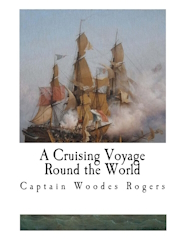 A Cruising Voyage Round the World by Captain Woodes Rogers. With Introduction and Notes by G.E.Manwaring. Woodes Rogers (c. 1679 – 15 July 1732) was an English sea captain and privateer and, later, the first Royal Governor of the Bahamas. He is known as the captain of the vessel that rescued marooned Alexander Selkirk, whose plight is generally believed to have inspired Daniel Defoe’s Robinson Crusoe. Rogers came from an affluent seafaring family, grew up in Poole and Bristol, and served a marine apprenticeship to a Bristol sea captain. His father held shares in many ships, but he died when Rogers was in his mid-twenties, leaving Rogers in control of the family shipping business. In 1707, Rogers was approached by Captain William Dampier, who sought support for a privateering voyage against the Spanish, with whom the British were at war.…
A Cruising Voyage Round the World by Captain Woodes Rogers. With Introduction and Notes by G.E.Manwaring. Woodes Rogers (c. 1679 – 15 July 1732) was an English sea captain and privateer and, later, the first Royal Governor of the Bahamas. He is known as the captain of the vessel that rescued marooned Alexander Selkirk, whose plight is generally believed to have inspired Daniel Defoe’s Robinson Crusoe. Rogers came from an affluent seafaring family, grew up in Poole and Bristol, and served a marine apprenticeship to a Bristol sea captain. His father held shares in many ships, but he died when Rogers was in his mid-twenties, leaving Rogers in control of the family shipping business. In 1707, Rogers was approached by Captain William Dampier, who sought support for a privateering voyage against the Spanish, with whom the British were at war.…